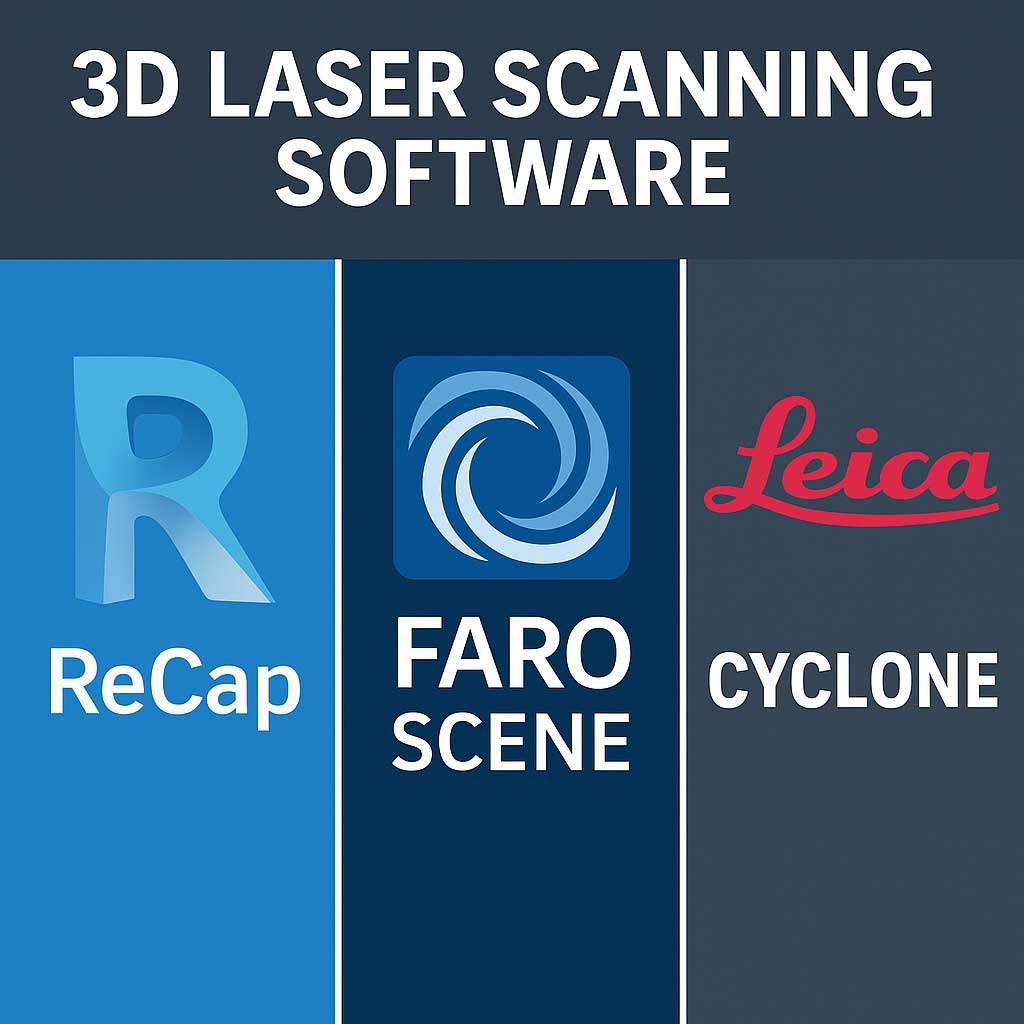Explore top 3D laser scanning software options like ReCap, FARO Scene, and Leica Cyclone. Compare features, use cases, and find the best tool for your scanning workflow.

Popular 3D Laser Scanning Software: What Works Best and When
A high-performance 3D laser scanner is only as good as the software behind it. Whether you’re registering scans, cleaning point clouds, or building BIM models, the right software can save hours of work and enhance your deliverables. In this guide, we’ll break down the most popular 3D scanning software options — what they do best, and when to use them.
1. Autodesk ReCap Pro
ReCap Pro is one of the most widely used point cloud processing tools for Autodesk users. It’s ideal for converting scan data into formats compatible with AutoCAD and Revit.
- Easy cloud-to-cloud registration
- Supports .rcs/.rcp formats for BIM workflows
- Integrated directly with Autodesk Construction Cloud
- Subscription-based (monthly or yearly)
Best for: Architects, engineers, and BIM managers using Revit
2. FARO SCENE
FARO SCENE is built for FARO laser scanners but also supports third-party point cloud data. It excels in automated registration, object recognition, and scan colorization.
- Real-time scan viewing and pre-alignment
- Automated registration with targets or targetless workflows
- Works well for forensics and crash scene modeling
- Includes powerful visualization tools
Best for: Forensics, industrial facilities, and users of FARO hardware
3. Leica Cyclone Register 360
Cyclone Register 360 is Leica’s advanced scan registration platform for aligning point clouds and preparing them for modeling. It supports seamless integration with Leica hardware and supports automated workflows.
- High-speed, large-scale registration tools
- Compatible with Leica RTC360, BLK360, and P-series scanners
- One-click publishing to TruView or JetStream
- Supports cloud and target-based alignment
Best for: High-volume scanning and Leica equipment users
4. Trimble RealWorks
Trimble RealWorks is a full-featured point cloud processing suite for professionals working in construction and civil engineering. It combines registration, modeling, and analysis in one platform.
- Powerful modeling tools for pipes, surfaces, and structural elements
- Seamless integration with Trimble total stations and laser scanners
- Useful for deformation and volume analysis
Best for: Surveyors, plant engineers, and Trimble ecosystem users
5. CloudCompare (Open Source)
CloudCompare is a free, open-source point cloud editor with advanced tools for segmentation, comparison, and filtering. It’s widely used for academic research and smaller projects.
- Supports multiple formats (.las, .ply, .e57, etc.)
- Includes cloud comparison, distance calculation, and mesh generation
- Active plugin ecosystem and strong community support
Best for: Researchers, hobbyists, and lightweight editing
Which One Should You Choose?
The right software depends on your scanner, industry, and desired output. For BIM workflows, ReCap is a solid choice. For forensics or industrial users, FARO SCENE or RealWorks may be a better fit. And if you use Leica hardware, Cyclone is the clear go-to.
Need flexibility? CloudCompare is free and versatile for general tasks.
Conclusion
Software is the bridge between raw scan data and meaningful deliverables. Whether you’re modeling, measuring, or managing a team, choosing the right 3D laser scanning software is essential to a streamlined workflow.
Explore more in our software buyer’s guide or check scanner/software bundles in our equipment catalog.
Popular 3D Laser Scanning Software: What Works Best and When
Published July 2025 by Palugada Surveying
1. Autodesk ReCap Pro
Best for: Beginners, architects, and Revit users
Platform: Windows
Integrates with: Autodesk Revit, AutoCAD, Civil 3D
ReCap Pro is known for its intuitive interface, powerful cloud-based registration, and seamless workflow into Autodesk BIM tools. It’s ideal for users already in the Autodesk ecosystem.
2. FARO SCENE
Best for: High-speed terrestrial scans, industrial users
Platform: Windows
Integrates with: FARO hardware, Autodesk, Leica (via export)
FARO SCENE is optimized for FARO scanners and supports real-time registration, automated object recognition, and VR previews. It’s highly customizable for advanced point cloud workflows.
3. Leica Cyclone
Best for: Infrastructure, BIM professionals, large projects
Platform: Windows
Integrates with: Leica scanners, Revit, MicroStation
Cyclone is a powerhouse software suite offering tools for registration (Cyclone REGISTER), modeling (Cyclone MODEL), and cloud sharing (Cyclone ENTERPRISE). It handles massive datasets efficiently and includes automated extraction tools.
4. Trimble RealWorks
Best for: Civil engineering, topographic mapping
Platform: Windows
Integrates with: Trimble Business Center, AutoCAD
Designed specifically for Trimble hardware, RealWorks enables fast, accurate registration, surface modeling, and volume computation. It’s ideal for construction, utilities, and geospatial teams.
5. CloudCompare (Open Source)
Best for: Lightweight workflows, academic use, open-source fans
Platform: Windows, macOS, Linux
Integrates with: All point cloud formats
CloudCompare is a free, open-source tool with impressive capabilities for point cloud editing, comparison, filtering, and mesh generation. While it lacks full automation, it’s a great utility for fast, small-scale tasks.
6. 3DReshaper / Trimble Perspective
Best for: Mesh generation, topography, inspection
Platform: Windows
Integrates with: Various scanner formats
3DReshaper (now part of Trimble) focuses on transforming raw point cloud data into actionable 3D meshes for inspection, surface modeling, and volume analysis.
Choosing the Right Tool for Your Workflow
- For BIM integration: ReCap Pro, Leica Cyclone
- For industrial scans: FARO SCENE, RealWorks
- For flexible, low-cost editing: CloudCompare
- For advanced surface work: 3DReshaper
Keep in mind scanner compatibility, required deliverables, and user skill level when making your choice.
Conclusion
The best 3D scanning software is the one that fits your scanner, your deliverables, and your budget. Each platform has strengths, and many professionals use multiple tools depending on project type.
Want to see how different software compares in your workflow? Check out our software comparison chart or explore licensed software packages in our shop.

Leave a Reply